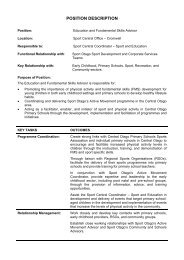Facilitator Troubleshooting checklist (PDF, 65 Kb)
Facilitator Troubleshooting checklist (PDF, 65 Kb)
Facilitator Troubleshooting checklist (PDF, 65 Kb)
Create successful ePaper yourself
Turn your PDF publications into a flip-book with our unique Google optimized e-Paper software.
• The question is not<br />
sufficiently clear or<br />
focused.<br />
If the group really trusts that you do not<br />
have a specific answer in mind, you might<br />
give an example to give them an idea of<br />
the type of answer you are looking for.<br />
4. Group<br />
Responding<br />
With Superficial<br />
Answers<br />
• Members of the group<br />
feel unsafe; the group<br />
is not ready to<br />
participate.<br />
Try less serious conversation topics until<br />
the group begins to trust you and the<br />
process and is confident that they will be<br />
taken seriously and/or are willing to take<br />
responsibility for the results.<br />
• Questions are not<br />
specific enough.<br />
Test questions in advance by asking them<br />
of others in your NSO/RST or club. If<br />
possible share questions with a cofacilitator<br />
or mentor.<br />
• Participants have a<br />
hidden agenda.<br />
Ask more specific questions to give an<br />
opportunity for hidden agendas to become<br />
explicit.<br />
5. Some<br />
Participants<br />
Dominate<br />
• Perhaps they don’t<br />
feel they have been<br />
heard (yes, even if the<br />
group finds this hard<br />
to believe!).<br />
Listen seriously, demonstrate “hearing<br />
them” by writing, or active listening, and<br />
respectfully cutting off–”I think we’ve got<br />
your main point(s). I’d love to hear more at<br />
the break. Now, somebody else.”<br />
• The person who is<br />
charged with<br />
responsibility for the<br />
outcome doesn’t trust<br />
the group.<br />
Take that person aside, check for<br />
concerns, and let him or her know about<br />
possible consequences of dominating the<br />
process and how his or her style of<br />
participation affects the outcome. Address<br />
his or her concerns about the process with<br />
the group if appropriate.<br />
• Conversation style<br />
may be too open or<br />
appear unstructured.<br />
Go around the room on a few questions.<br />
Ask each person to respond succinctly.<br />
• There is an imbalance<br />
between those who<br />
are quiet and those<br />
who love to speak in a<br />
group.<br />
Divide into small groups. You might mix<br />
quiet and expressive types together. Then<br />
have the groups report their results to the<br />
larger group.<br />
6. Group Goes<br />
• Group wants to<br />
escape topic or<br />
Reflect with the group about what’s<br />
happening, or by just asking the group,<br />
Page 2 of 3
















